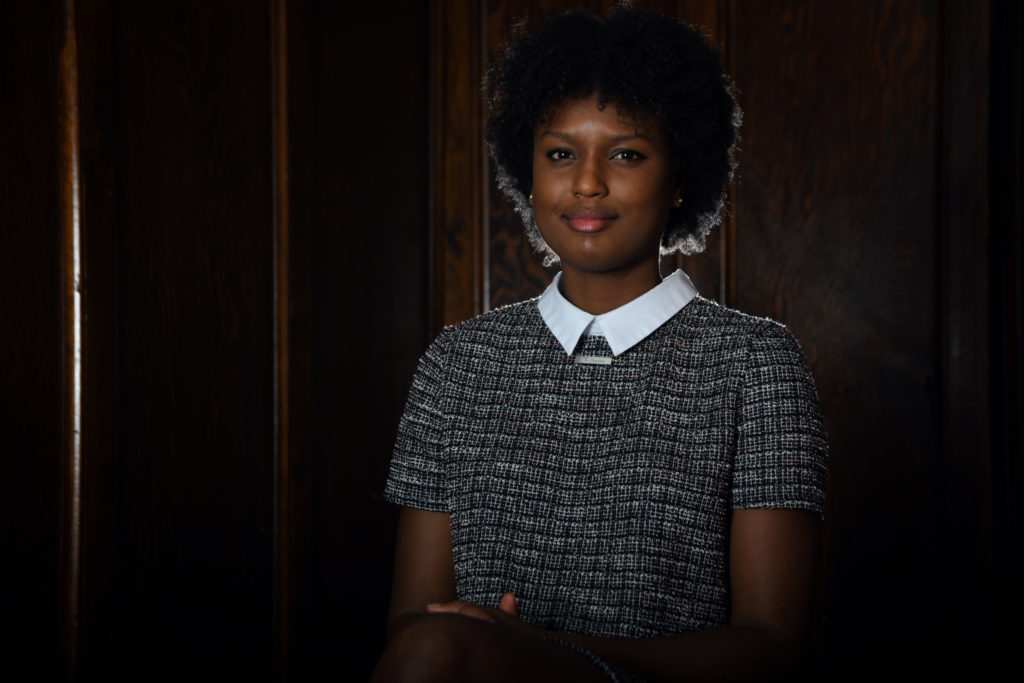Year: Junior
Hometown: Philadelphia, Pa.
Major: Political Science
Clubs/activities: Intersectional Feminist of Color Collaborate, Receptionist at the Multicultural Student Services Center, Black Student Union, Black Girl Mentorship Program, Program Board
Previous SA experience: CCAS senator, U-at-Large, Student Life Committee Chairwoman
Favorite GWorld spot: Carvings
Dream job: Political consultant. I want to help young women get into office.
Nickname: “The senator”
Favorite show on Netflix: “The Mind of a Chef”
Fun fact: I love to paint.
Most-used or favorite emoji: Laughing face and the moon emojis
Favorite movie of the last year: “Star Wars: The Last Jedi”
When Imani Ross arrived at GW, joining student government was never a part of the plan.
In high school, she was a talented basketball player that was recruited by Dartmouth College in her sophomore year. But Ross had a “larger passion for social justice” that she couldn’t pursue on a basketball scholarship – so she decided to come to GW.
Ross envisioned she would have a typical college experience, but she was attracted to the idea of campus advocacy and speaking up for others – compelling her to run for a spot in the Student Association Senate in the spring of her freshman year.
“I wanted to come to college and live my best life and meet my college friends and just coast four years – and of course, that didn’t happen,” she said. “That’s never been my life, so I don’t even know why I thought that was possible. I never, in a million years, thought this is what I would be doing in college.”
Ross served as a senator for the Columbian College of Arts and Sciences as a sophomore and is currently an undergraduate-at-large senator.
Her commitment to helping others was solidified when she won the George Washington Black Alumni Association Emerging Impact Award in 2016, which is given annually to celebrate students and alumni that have shown commitment to change at GW. Ross won for her “commitment to improving community” on campus and in student organizations like the Black Student Union.
“I knew I was doing a lot of stuff, but it was the first moment that I realized that people were recognizing that,” she said. “It set the tone for why I continued to be in the Student Association and why I continued to help other students, friends and peers.”
Ross said her desire to help others – especially minority students – was the foundation of her campaign. After a racist Snapchat post caused deep outrage across campus last month, Ross spearheaded a resolution in the senate calling for the removal of the sorority involved in the post and asking the University to implement a slew of new diversity measures.
Although her platform touches more than 10 points focusing on access, community and transparency, she said her biggest goal is to improve campus life for students of color.
Ross is seeking to create a diversity and inclusion council comprised of student organization leaders who can represent the needs and issues of various campus communities. She is also calling for an introductory cultural competency class requirement – mandating that all students take at least one course on a topic like Women in Politics, Race and Racism and The African American Experience.
If elected, Ross would be the first black female president of the SA. The last time the SA had a black president was in the 2006-07 academic year.
“In the past three years I’ve been here, it’s been a struggle not only for me, but for my friends,” she said. “Out of everything in my platform, I am going to make sure that students of color’s voices are absolutely heard and make sure that students are given an equal and fair chance to have a successful four years.”
Ross said she also considered the SA community when creating her platform points, focusing on incomplete initiatives from past presidents. She said she and her team spoke with past SA members to find out the programs they valued and even took some ideas from SA presidencies as far back as the 1990s – like the renovation of the Marvin Center terrace – an idea that popped up in 2006.
But Ross said these ideas haven’t made headway yet, and other parts of her platform focus on new initiatives that have never been tried.
“A lot of things in my platform haven’t been done, and I think that’s important, especially for GW,” she said. “I think we harp a lot on our market basket schools, but I think we’re about making history, so why not try something new?”





